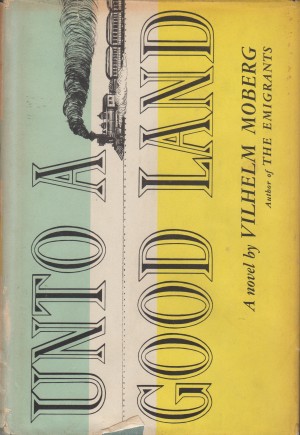
Unto a Good Land by Vilhelm Moberg (1954. Simon and Schuster. ISBN 978-0873513203)
This second novel in the “Emigrant” series written by Swedish author, Carl Artur Vilhelm Moberg continues the story of a small band of Swedes who leave their native land for the United States in the early 1850s. Whereas the first novel in the series, The Emigrants, was entirely set either in rural Sweden or aboard the brig, the Charlotta that journeyed from Europe to North America with a cargo of pig iron and humanity aboard, Unto a Good Land is firmly set on the shores of the brash and newly constituted republic of the United States of America.
Moberg does a yeoman’s job of depicting the overland journey of Karl Oskar Nilsson, his wife Kristina, their children, and the divergent band of immigrants that accompany them from Manhattan to Taylors Falls, Minnesota, an isolated lumbering town located on the wild and scenic St. Croix River. The timeframe, as I’ve said, is the 1850-1851. Wisconsin, on the eastern banks of the St. Croix, has attained statehood (1848). Minnesota, which occupies the eastern banks of the river, is part of the Minnesota Territory, created in 1849 and destined for statehood in 1858.
The author makes the plodding, tedious, harrowing journey of the émigrés aboard river packet, canal barge, railroad car, paddle wheeled riverboat, and finally, on foot from Stillwater to Taylors Falls come to life, casting the iron-willed former prostitute, Ulrika of Vastergöhl as the foil to Kristina Nilsson’s motherly virtue for the majority of the trek. The cast of characters also includes Karl Oskar’s impetuous and truth-challenged younger brother, Robert, whose dreams of California gold fields make his dedication to aiding his older brother’s homesteading ambitions problematic. There’s trouble in the wind whenever Robert takes center stage in this familial drama but the tension between Karl and Robert isn’t overt: Moberg deftly creates his characters of whole cloth, giving them real-life motivations and actions, rather than instilling his creations with stereotypical feelings and emotions. This having been said, the tension between the brothers is palpable and real despite the cleverness of Moberg’s prose: you anticipate a break and indeed, it occurs.
The details that one would expect in a fine settlers’ accounting of felling trees, grubbing soil, and building cabins are well described and historically accurate. A childbirthing scene, where Kristina demands that Karl Oscar deliver the prostitute Ulrika to the Nilsson cabin to assist with the birth of their son, is poignantly tense and tender, with the reconciliation of the two women entirely believable and well wrought.
As he did in The Emigrants, Moberg spends much time chronically the faith of the immigrants, taking the prophet-like Danjel Andreasson from the heights of evangelical zeal to the depths of despair. Danjel fled Sweden under the threat of excommunication from the Evangelical Lutheran Church, the national church of Sweden, for ministering to his flock without proper education or ordination. Moberg casts the itinerant pastor as a sort of modern-day John the Baptist or Martin Luther; a man so convinced of his direct connection to God that he forswears the rigor and organization of the state church to the jeopardy of his soul. But though the preacher discovers that he is free, once in America, to speak his mind and search for his vision of heaven, Moberg portrays Danjel as dejected, fallen, and unsure: it is a marvelous change in character that is entirely believable given the pastor lost his wife on the Charlotta, her body having been buried in the cold waters of the North Atlantic after being wracked with disease.
Unlike the first novel, which seemed to be inordinately preoccupied with, well, procreation, Unto a Good Land is far less titillating in its carnality and far more educational and interesting as a piece of historical fiction. Not that sex is necessarily a bad thing in a historical novel but here, Moberg puts the desires and physical intertwining of his characters in the background and lets their work ethic, spirituality, and interpersonal connections shine through.
A well-written and insightful story of Scandinavian immigrants coming to my “neck of the woods.”
4 and ½ stars out of 5.
Mark
(This review originally appeared on the Rural Lit R.A.L.L.Y. blogsite. Find out more about that organization’s efforts to promote and save vanishing emigrant, immigrant, and Great Plains related fiction at: http://www.rurallitrally.org)


